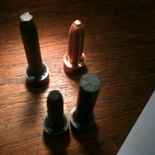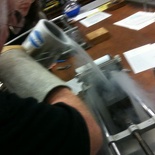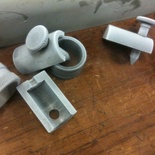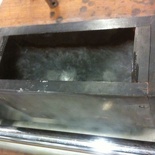Guess what we get to do in the engineering laboratories today, well it’s not everyday where you get to use the words “copper, steel and liquid nitrogen” in the same sentence nor being able to work with them in the lab at a go. But not when you are during destructive testing of material specimens in the materials laboratory. This experiment investigates and studies the metallurgic properties of ductile metals in extremely cold temperatures.
Our lab technician in charge has some crazy whack for liquid nitrogen, not to mention an immunity to it as well, exclaiming his long years of working with the substance had made his skin so tough, he is immune to it’s gut freezing effects even after completely immersing his hands in a pool of liquid at −196 °C. Humorously, he always does the pour and “finger stir” each time comes over to fill our liquid nitro receptacles, much to the gawking of the students I guess he intends to freak out in the first place!
Notably, the tensometers used here in the labs are ancient. I mean hand crankingly ancient (you even have to dot plot the stress-strain curves out while cranking the specimen) amazing! There is not even a single bit of automated machinery in the aid of conducting the experiment. I remembered the lecturer in-charge telling the class that this will possibly be the first and last time you get to touch these (primitive) tensometers, which is rather true too having used digital automated ones back in Singapore and is already an industry standard worldwide in material destructive testing.
Old? and I mean whoa, even the Vickers hardness testing machines are all hand cranked, I remembered the modern industrial ones I use which takes readings at a touch of a button with digital readouts. Even the tensometers as computer assisted which automatically plots and prints a yield stress strain curve upon specimen failure and data collected. I guess that’s what you get studying in a university department almost a few centuries old. So much for an eye-opening whacky experiments, and I think this is just more of such to come.




